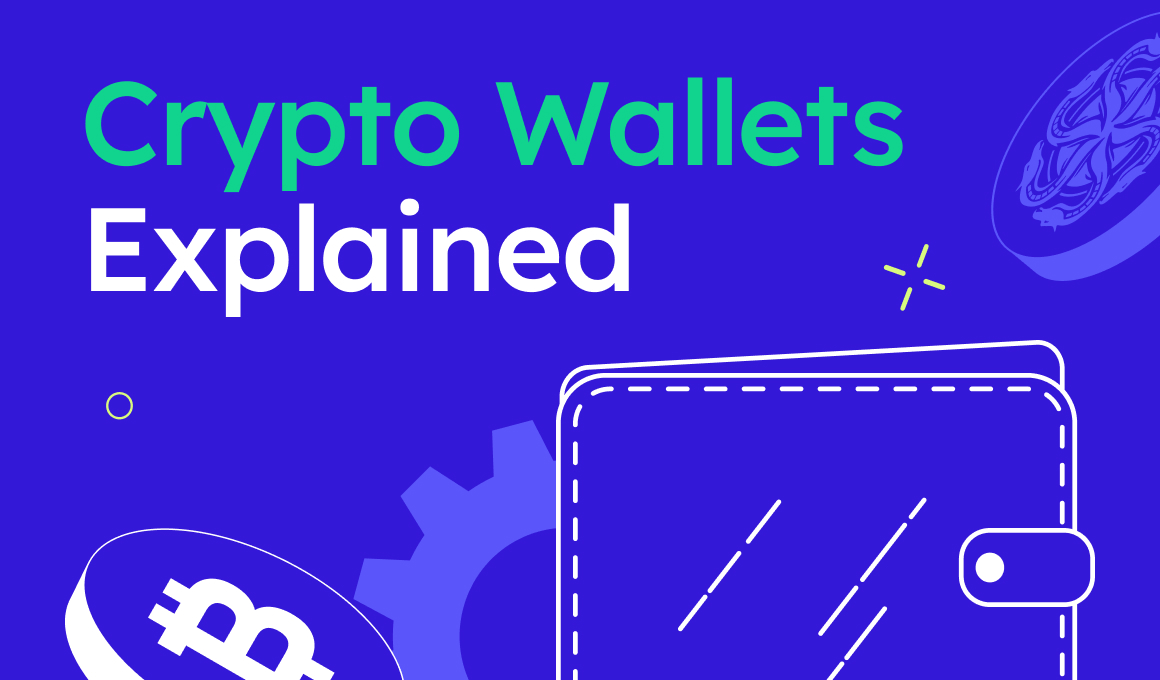So, you’ve decided to enter the new age of finance and are about to invest into crypto. Before you do any of that, before even choosing your coin or token, you need your own crypto wallet where you can store your assets.
Crypto wallets – an introduction
A cryptocurrency wallet is a software program that stores public and private keys and interacts with various blockchain networks, allowing users to send and receive digital currency and monitor their balance.
In simple terms, a crypto wallet is like a bank account that is used to store, manage, and transfer cryptocurrencies such as Bitcoin, Ethereum, and other altcoins. of your wallet as a secret vault that holds the key to your digital fortune.
Saying that crypto wallets hold your crypto is actually incorrect. Wallets are merely a gateway to the blockchain, which are used to show you what is happening on the network. They do not actually “contain” your assets, but allow you to read the information about your assets. As such, nothing is “physically” stored in wallets. Still, the wallet is the most important asset you have.
There are various types of crypto wallets available, including hardware wallets, software wallets, mobile wallets, and web wallets. Each of these wallets has its own unique features and benefits, and the choice of wallet depends on the user’s specific needs.
Wait, you mentioned public and private keys. What are those?
In unintelligible language that prevents crypto mass adoption: Public and private keys are a pair of cryptographic keys used in asymmetric encryption. The public key is used to encrypt data that can only be decrypted using the corresponding private key. The private key is kept secret and is used to decrypt the data that was encrypted with the public key. This system is used for secure communication and authentication on the internet, such as with HTTPS and SSL/TLS.
In normal human language: In cryptography, public and private keys are like a lock and key. Imagine you want to send a secret message to your friend. You give your friend a lock (the public key) and keep the key (the private key) to yourself. Your friend can use the lock (public key) to lock the message and send it back to you. Once you receive the locked message, you can use your key (private key) to unlock it and read the secret message. This way, even if someone intercepts the locked message, they won’t be able to read it without your key.
In wallet terms, private keys are what lets you access your assets and make transactions. They are the literal keys to the vault – your wallet.
So, now that that’s out of the way…
The importance of crypto wallets
Secure storage of digital assets
Cryptocurrency wallets provide a secure way to store digital assets such as Bitcoin, Ethereum, and other cryptocurrencies. These wallets use encryption and private keys to protect your assets from unauthorized access and theft.
Control over your assets
With a cryptocurrency wallet, so long as it’s decentralized, you have complete control over your digital assets. You are not reliant on a third-party such as a bank or exchange to store your funds, which can be vulnerable to hacks or shutdowns. You have the ability to send and receive funds on your own terms, without having to rely on a centralized authority.
Convenience
Cryptocurrency wallets offer a convenient way to manage your digital assets. You can access your wallet from anywhere in the world as long as you have an internet connection. You can send and receive funds quickly and easily, without having to go through a lengthy and expensive process.
Investment opportunities
Cryptocurrency wallets also allow you to take advantage of investment opportunities in the crypto space. By holding your digital assets in a wallet, you can participate in staking, earn rewards, and gain exposure to new projects.
Access to Web3
As cryptocurrencies become more mainstream, it’s important to have a wallet to interact with this new financial system, largely known as Web3. With the increasing acceptance of cryptocurrencies as a legitimate form of payment, it’s likely that more businesses will start accepting them. Having a cryptocurrency wallet now will future-proof your financial assets and ensure that you are ready for what’s to come.
Now, you might be wondering, “Why do I even need a wallet, can’t I just store my crypto on an exchange?” This is probably one of the most important choices you will make on your crypto journey.
While centralized crypto exchanges offer the convenience of their own wallets, there are things to know before making that kind of choice. Let’s see it in detail.
The most important choice in crypto
There are many different factors that can influence your decision on choosing that crypto wallet or the other. However, there is one crucial characteristic to wallets that makes all the difference, and can make or break your crypto journey. It defines how wallets function, how you access them, and if, at all, you really own your assets. It is the issue of centralization vs decentralizaton.
Centralized wallets and DeFi wallets are two different types of crypto wallets that offer distinct features and benefits.
Centralized wallets
As the name suggests, centralized wallets are owned and managed by a centralized authority or organization, most often a centralized exchange (CEX) where you can buy and trade crypto. These wallets are typically web-based or mobile-based and allow users to store, send, and receive cryptocurrencies, among other things.
Centralized wallets are easy to use and offer a user-friendly interface, making them ideal for beginners. They also offer features such as customer support and account recovery, which can be beneficial in case of lost or stolen devices. However, the downside of centralized wallets is that they are controlled by a single entity, which means that the user does not have full control over their funds. Essentially, the assets are not under your control and you do not have complete ownership of them. Additionally, crypto exchanges are a prime target for hackers, and if an exchange is hacked, your funds could be at risk. It’s much safer to store your crypto in a private wallet that only you have access to.
DeFi wallets
DeFi wallets, also known as decentralized wallets, are non-custodial wallets that are based on blockchain technology. These wallets allow users to store their cryptocurrencies securely and offer complete control over their funds. DeFi wallets also provide users with access to various decentralized finance (DeFi) applications, such as lending, borrowing, and trading. These applications are built on top of the blockchain, which means that they are decentralized, transparent, and trustless. The benefits of using DeFi wallets include increased security, transparency, and control over your funds. However, DeFi wallets can be complex and require more technical knowledge to use than centralized wallets. Additionally, since they are still relatively new, DeFi wallets can be prone to bugs and other security vulnerabilities.
In summary, centralized wallets are easy to use but offer less control over your funds, while DeFi wallets offer more control and security but require more technical knowledge to use. The choice between the two depends on your priorities and preferences.
Hot wallets vs cold wallets
Hot wallets and cold wallets are two different approaches to storing cryptocurrencies. They each have their unique features and advantages.
Hot wallets
A hot wallet is always ready and accessible to you. You can open it up quickly and start making transactions with ease. It’s called “hot” because it is always online and connected to the internet, making it a great tool to react on the go and easily check up on your funds. However, as such, it is vulnerable to hacking attempts and security breaches.
Hot wallets are perfect for users who need quick access to their funds and are willing to accept the risks that come with online wallets. They are also ideal for traders who frequently buy and sell cryptocurrencies and need to make quick transactions.
Cold wallets
On the other hand, a cold wallet is impervious to external attacks and shielded from any online dangers. It is an offline wallet that is not connected to the internet, and as such, it is immune to hacking attempts and malware attacks. However, cold wallets can be cumbersome and slow to access, requiring physical access to transfer funds, which takes time and can only be done in an appropriate setting.
Cold wallets are be better choice for users who do not trade frequently and want to store large amounts of cryptocurrencies for extended periods without any worry of theft or hacking.
Cold wallet is not the same as hardware wallet
A cold wallet is a cryptocurrency wallet that is not connected to the internet, and therefore, it is also known as an offline wallet.
A hardware wallet, on the other hand, is a type of cold wallet that is a physical device that stores your private keys and cryptocurrency offline. Hardware wallets are specifically designed to provide maximum security for cryptocurrency storage. They usually come in the form of a USB-like device that connects to your computer or mobile device via a USB or Bluetooth connection.
So, while all hardware wallets are cold wallets, not all cold wallets are hardware wallets. Cold wallets can also include paper wallets or even a computer that is not connected to the internet.
Choosing the right wallet
When choosing a crypto wallet, there are a few things to consider.
Compatibility
First and foremost, you want to make sure the wallet is compatible with the cryptocurrencies you’re holding or want to acquire. Do they support that blockchain network? If so, do they offer support for the token in questions? If the answer to both questions is a “yes”, then you can put a checkmark on the matter of compatibility.
Security
Probably the most fundamental aspect of every wallet is how it handles security, so that you know your assets are protected.
When it comes to crypto wallet security, there are several things you should consider before selecting a wallet. Here are some actionable tips to help you research wallets:
- Make sure you can access your seed phrase: A security phrases, also known as seed phrase, is what lets you access your wallet. It is vital for the security of a cryptocurrency wallet, safeguarding against unauthorized access to your funds. It is also the only way to recover your wallet if your device fails, is stolen, or damaged, and you lose access to it. By entering the seed phrase, you quickly regain control of your funds. This is not true for centralized wallets, however.
- Can you use an additional passphrase: Passphrases offer an additional layer of security to your funds, strengthening the wallet even more. Some wallets even allow users to create their own passphrase or security phrase, giving them greater control over the security of their wallets.
- Multi-Layer Security: Look for wallets that offer advanced security features, such as two-factor authentication, multi-signature support, and cold storage options. These features can help protect your assets from theft or hacks.
- Backup and Recovery: Check if the wallet offers backup and recovery options. In case you lose your wallet or device, you can restore your assets using your backup. Make sure you keep your backup in a secure location.
- Open-Source: Consider using an open-source wallet. These wallets are open for public scrutiny, making it more difficult for attackers to exploit vulnerabilities.
- Support: Check if the wallet provider offers support in case of issues or queries. A responsive support team can help you quickly resolve any problems that may arise.
By considering these factors, you can research and select a wallet that provides the level of security and convenience that meets your needs.
Remember to also practice good security habits, such as keeping your passwords and seed phrases private, regularly updating your software, and using anti-virus software.
User Interface
Look for wallets with user-friendly interfaces that make it easy for you to manage your assets. A wallet with a confusing or difficult-to-use interface may increase the risk of user error. Also, consider wallets that offer in-app help or additional tips and explanations for their services. This can make your entry easier.
Reputation
Check the reputation of the wallet provider. Look for reviews, ratings, and feedback from other users. A wallet provider with a good reputation is more likely to be trustworthy and reliable.
Read reviews (seriously)
In crypto, consensus matters (pun intended). Reading reviews when choosing a cryptocurrency wallet is essential because it can help you make an informed decision and avoid potential risks. You can also look for rankings of the best crypto wallets online, but always make sure that you are using reputable sources for your information.
These general suggestions should give you a solid starting point on the way to choosing the right wallet for your needs.
Popular cryptocurrency wallets
There are several popular cryptocurrency wallets that users can choose from depending on their needs and preferences. Here are some of the most well-known ones:
- Ledger Nano S: The Ledger Nano S is a hardware wallet that stores cryptocurrency offline, providing an extra layer of security. It supports over 1,500 cryptocurrencies and is known for its ease of use.
- Trezor: Trezor is another popular hardware wallet that supports over 1,000 cryptocurrencies. It is known for its robust security features and user-friendly interface.
- Changex wallet: Changex is a non-custodial DeFi wallet that supports several blockchains and more than 50 cryptocurrencies. It is also one of the first DeFi projects that is integrating functioning bank accounts and crypto debit cards in its wallet.
- Exodus: Exodus is a software wallet that supports over 100 cryptocurrencies. It is known for its attractive user interface and ease of use.
- Coinbase Wallet: Coinbase Wallet is a mobile wallet that supports several cryptocurrencies, including Bitcoin, Ethereum, and Litecoin. It is known for its simple and easy-to-use interface.
- MyEtherWallet: MyEtherWallet is a software wallet that is specifically designed for storing Ethereum and other ERC-20 tokens. It is known for its ease of use and robust security features.
Final thoughts
Your wallet is the most important instrument you have when navigating the cryptocurrency space. Wallets provide a secure and convenient way to store and manage your digital assets, and they offer investment opportunities that are not available through traditional financial institutions. But before you choose your wallet, always remember – Do Your Own Research and do it well. Your wallet is everything.
We hope you’ve found this article useful. Keep reading and keep learning – explore our articles below.






